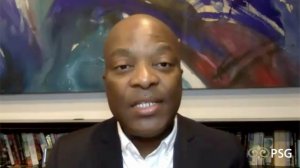Renowned South African political commentator Justice Malala on Tuesday expressed positive sentiments on the possibility of prosperity with the formation of the Government of National Unity (GNU), however, he warned that there are significant risks that various parties could pull apart.
Malala was speaking at financial services company PSG Financial Services’s Think Big webinar, where he highlighted that the biggest challenge for the coalition was ensuring that parties “stick together” for a significant amount of time.
After losing its outright majority in the 2024 national and provincial elections, the African National Congress (ANC) was forced to approach opposition political parties to form the GNU.
Eleven political parties with seats in the National Assembly have signed the Statement of Intent (Sol).
“I am very happy that primarily ANC President Cyril Ramaphosa, Democratic Alliance (DA) leader John Steenhuisen and DA federal council chair Helen Zille managed to strike this deal. And I think this deal gives us an opportunity, I think it is a chance for South Africa to really do something extraordinary,” he said.
Malala noted that this era could yield the economic revival that citizens have been asking for.
He expressed enthusiasm that even the markets were happy with the GNU formation, adding that the rewards – such as the strengthening of the rand – ought to be celebrated.
He pointed out that since the formation of the GNU and the signing of the SoI, the building and negotiations report-backs from various players had been positive.
Malala explained that what was key in the coalition was for political parties, especially the ANC and DA, to have the belief that it was “better, more rewarding and profitable” for them to be inside the coalition than to part ways.
However, he cautioned that there were significant risks that various parties could pull apart, noting that South Africa had always had consensus, primarily about economic policy.
He acknowledged that the coalition faced significant risks, however, he believed that political partners could push through.
“…yes, reparation, but a lot of hope and a lot of avenues where I think if the players get together [there] can be huge profit, politically, for them to say ‘look what we did with Home Affairs, look what we did with Agriculture, look at what we did with Finance’,” he said.
He stated that all these elements could work together, noting that various parties needed to see that there was profit for them in the coalition and to agree that there was no one winner.
Meanwhile, broadcast and financial journalist Alishia Seckam pointed out that it would be interesting to see how political parties in the GNU managed their differences to maintain stability and avoid political paralysis.
Malala admitted that it was problematic that the ANC secured a disproportionately high number of seats in the Cabinet and referenced the situation which unfolded in Gauteng, with Premier Panyaza Lesufi wanting to give the DA just three of the 11 portfolios available.
He found interesting the SoI agreement signed by Zille and ANC secretary-general Fikile Mbalula, which called for a deadlock-breaking mechanism.
He noted that in the last month of "fast" negotiations, some things in the agreement had not been properly agreed upon.
“What is the meaning and depth of consensus and consensus making, how much consultation does one do? These are some of the things that have not been clearly articulated just yet. I hope that they are articulated because the time will come when they will need to be used,” Malala pointed out.
EMAIL THIS ARTICLE SAVE THIS ARTICLE ARTICLE ENQUIRY
To subscribe email subscriptions@creamermedia.co.za or click here
To advertise email advertising@creamermedia.co.za or click here










